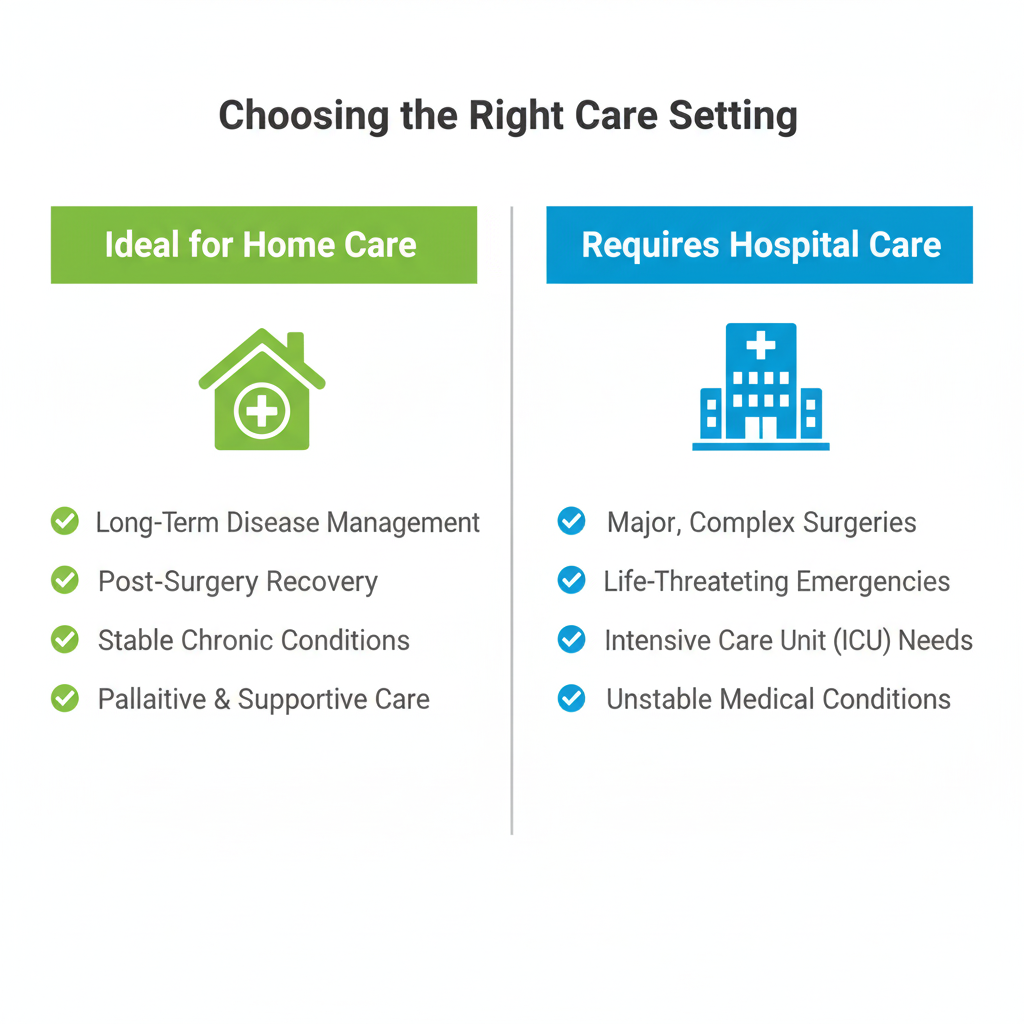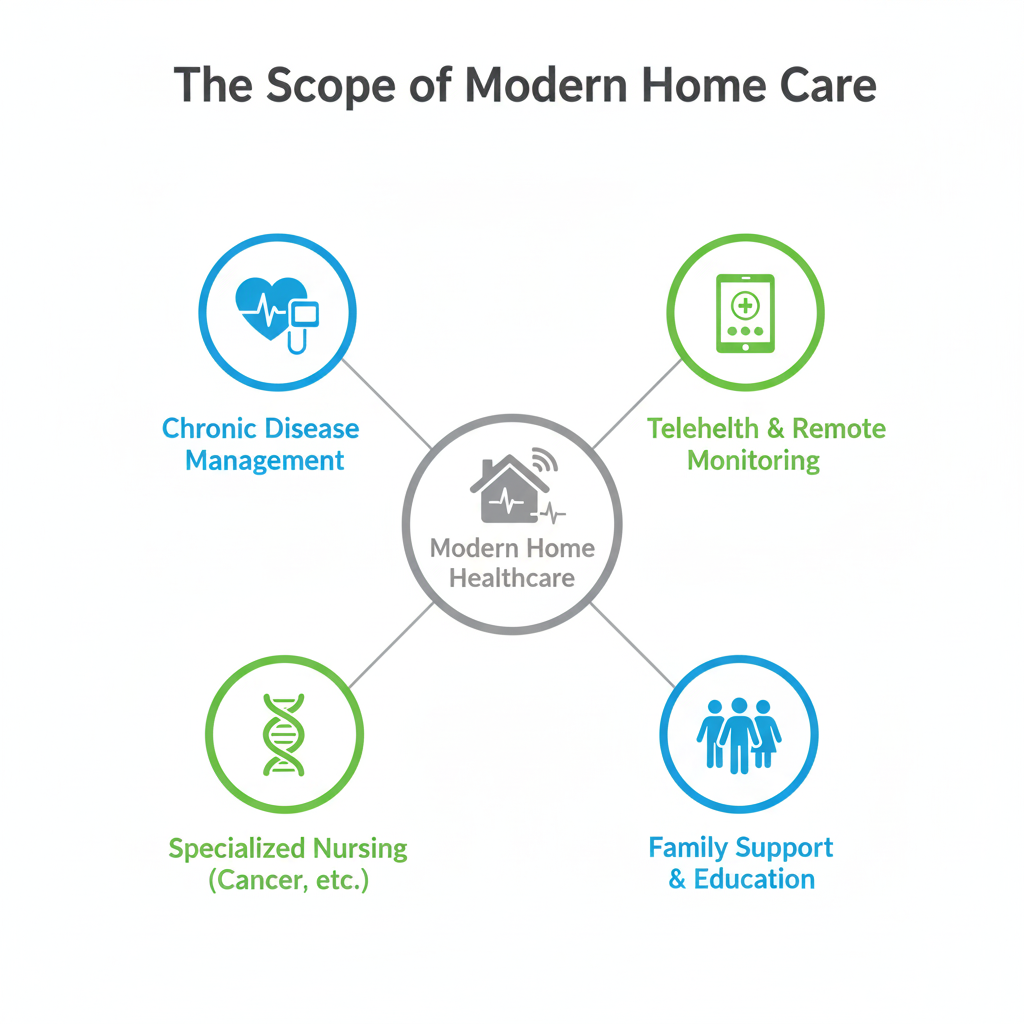Healthcare is changing fast. More people want care outside hospitals, especially for long-term health problems. Home care lets patients get medical help at home. This sounds simple, but does it really work for serious conditions?
The answer is yes. Home care can be very effective. Patients get personal attention in familiar places. This often leads to better health outcomes and happier families.
Dr. Morepen Home leads the way in home healthcare. They bring quality medical care right to your door. Their team knows that good health care doesn't always need hospital walls.
What Is Home Care?
Home care means getting health services at home. This can be basic daily help or complex medical care. The goal is simple - keep patients healthy and comfortable without hospital stress.
Home care offers something hospitals can't - truly personal care plans. Doctors and nurses can spend more time with each patient. They learn about daily routines, family needs, and personal goals. This knowledge helps create better treatment plans.
Doctor at home services bring medical expertise to your living room. No waiting rooms. No rushing between appointments.
Why Pick Home Care for Serious Health Problems?
Home care offers real benefits for people fighting serious illnesses:
More Personal Time: Healthcare workers can focus on one patient at a time. This means better attention and care plans that actually fit your life.
Comfort Matters: Your own bed, your own food, your family nearby. These things help healing more than most people realize.
Fewer Infections: Hospitals have sick people everywhere. At home, you avoid many germs that could make you sicker.
%20(1).png)
How Home Care Is Growing
Technology changed everything about home care. Equipment that once needed hospitals now works at home. Heart monitors, oxygen machines, and even some lab tests can happen in your living room.
More people choose home care every year. Heart disease, diabetes, and brain disorders - all these can be managed at home with the right help. Companies like Dr. Morepen Home keep adding new services to meet growing needs.
The Big Benefits of Home Care for Severe Illness
Care That Fits You
Every person is different. Home care teams learn your specific needs. They watch how you move, what foods you like, and how your family helps. This personal knowledge makes treatment work better.
Staying Out of the Hospital
Good home care prevents many hospital trips. Regular check-ups catch problems early. When nurses visit weekly, small issues don't become big emergencies. This saves money and stress.
Money Matters
Hospital stays cost a lot. Home care usually costs less than long hospital visits or nursing homes. The quality stays high, but your wallet feels better.
Family Gets Involved
Families become part of the care team at home. They learn to help with medicine, exercise, and daily tasks. This support system makes patients stronger and happier. Hospital staff can't offer this level of personal connection.
Home Care vs Hospital Care
Both have their place in healthcare. The key is knowing when to use each one.

When Home Care Works Better
Studies show home care often beats hospital care for many conditions. Patients recovering from surgery heal faster at home. Doctors see how patients live every day, which helps them make better treatment choices.
The Challenges Are Real
Home care isn't perfect. Some problems need hospital equipment. Setting up good home care takes planning. Not every medical emergency can be handled at home.
When Hospitals Are Needed
Some situations need hospital care. Heart attacks, major surgery, and intensive care can't happen at home. The trick is knowing when each type of care works best.
Smart families work with doctors to make these choices. The right care at the right time makes all the difference.
Quality of Life Gets Better
Home care changes how patients feel about their illness and their future.

Happier Patients
People getting care at home report feeling better about their treatment. They sleep in their own beds. They eat familiar food. They see family and friends easily. These simple things reduce stress and anxiety.
Staying Independent
Even sick people want some control over their lives. Home care helps patients do things for themselves when possible. This independence boosts mental health and keeps minds sharp.
Better Family Relationships
When someone is sick at home, families grow closer. Everyone learns to help. This shared experience often strengthens relationships and gives patients more emotional support.
Research proves that strong family support leads to better health outcomes. Patients fight harder when they feel loved and supported.
Home Care for Specific Health Problems
Different health conditions need different approaches to home care.
Long-Term Diseases
Diabetes, high blood pressure, and lung problems often improve with home management. Regular monitoring prevents sudden changes. Patients learn to manage their conditions day by day.
Cancer Treatment
Cancer patients often have weak immune systems. Home care keeps them away from hospital germs. Special nurses can manage pain and side effects. Families provide emotional support during tough treatments.
Good Nursing Strategies
The best home nurses do more than give medicine. They teach patients and families about symptoms to watch for. They help with diet planning and exercise routines. This complete approach keeps patients healthier longer.
Technology Helps Everything
Smart devices now track heart rates, blood sugar, and breathing patterns. Video calls connect patients with doctors instantly. Electronic records keep all caregivers on the same page. These tools make home care safer and more effective.
Measuring Success
How do we know home care actually works?

Looking at Results
Good home care reduces emergency room visits. Patients recover faster and feel more satisfied with their treatment. These measurable results prove home care's value.
Real Stories Matter
Patient stories show the human side of home care success. Families share how home care changed their lives. These personal accounts often convince others to try home care.
Expert Support
Doctors and researchers back up home care with solid evidence. Studies consistently show that well-managed home care works as well as hospital care for many conditions. Organizations like Dr. Morepen Home use this research to improve their services.
The Future Looks Bright
Home care will keep growing and improving.
New Trends Coming
Better diagnostic tools are moving into homes. Preventive care is getting more attention. Advanced telehealth systems will make doctor visits even easier.
Government Help
Governments worldwide see the benefits of home care. New policies support home healthcare. Insurance plans are covering more home care services. This makes home care available to more families.
.png)
More People Will Use It
As word spreads about home care benefits, more families will choose this option. Better technology and supportive policies will make this growth possible.
Final Thoughts
Home care works well for serious health conditions. It offers personal attention, family involvement, and real comfort that hospitals can't match. While hospitals remain important for certain emergencies, home care fills a crucial need for ongoing health management.
Dr. Morepen Home shows what dedicated home healthcare looks like. They prove that excellent medical care can happen anywhere patients feel comfortable and supported.
Home care isn't just about location - it's about connecting medical expertise with each person's unique life situation. Patients get more control over their health while families become active partners in healing.
As healthcare continues changing, home care will play a bigger role. The future of health includes homes as places of healing, not just hospitals. With the right team and proper planning, meaningful health improvements happen where patients feel most at home.
Common Questions
Does home care work for severe illnesses?
Yes, home care has proven effective for many severe conditions. It provides personalized, continuous care with benefits like reduced infection risk and tailored treatment plans. However, working with healthcare professionals helps determine the best care setting for each person's needs.
How does home care make life better?
Home care improves quality of life by providing medical attention in familiar surroundings. This reduces stress and anxiety while allowing greater family involvement. Patients often feel more satisfied and empowered when receiving care at home.
What does home healthcare cost?
Home healthcare often costs less than extended hospital stays or nursing facilities. Costs vary based on services needed, condition severity, and location. Providers like Dr. Morepen Home can help explain potential costs and financial options that work for your situation.
.png)



.png)
.png)
.png)
.png)
.png)
.png)
.png)

.png)
.png)
.png)

.png)
.png)
.png)
.png)
.png)
.png)

.png)
.png)

.png)
.png)
.png)

.png)

.png)


.png)







